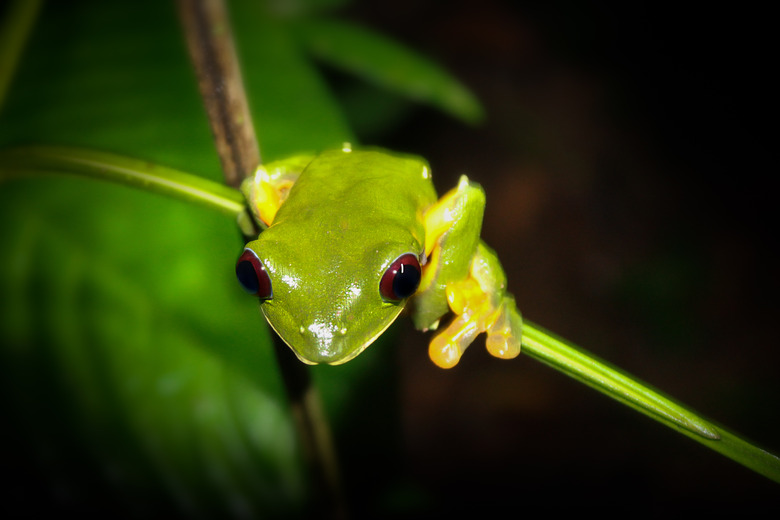Animals That Chirp At Night
Identifying the symphony of sounds that occurs when the sun goes down can be a challenge. Amphibians, rodents, reptiles and many other creatures exchange wordless dialogue to express a variety of messages from warning signals to mating calls. Their message take the form of short and low chirps, long melodic trills and everything in between.
TL;DR (Too Long; Didn't Read)
Many nocturnal animals chirp at night. Numerous species of frogs and toads emit a chirping mating call. Both northern and southern flying squirrels use chirps at night, to communicate to their social groups. Geckos are the most vocal reptiles. They emit chirps to warn off predators or protect their territory, and as mating calls. Bats use chirps as a form of echolocation to help them navigate in the dark, and to detect prey.
Mating Calls of Frogs and Toads
Mating Calls of Frogs and Toads
Male eastern American toads produce a chirp-like mating call that can last up to 30 seconds, usually heard near bodies of water that serve as their breeding grounds. In the Pacific Northwest, typically nocturnal boreal toads dwell in wet environments, where they emit high nocturnal chirps reminiscent of young geese. Cliff chirping frogs are endemic to limestone-heavy areas of central and western Texas; they emit short, clear chirping noises late into the night that resemble those of a cricket. A musical, two-note chirp as loud as 90 decibels may be heard through the night from the male coqui frog throughout the southeastern United States, Hawaii and Puerto Rico.
Social Chirps of Flying Squirrels
Several nocturnal squirrel species make chirping sounds during their active hours. Northern flying squirrels make low chirps in the coniferous forests where they live, while southern flying squirrels emit a similar-sounding chirp in mixed and deciduous forests. Both species are social. The northern flying squirrels commonly nest in small groups of up to eight members, while the large dens of southern squirrels, numbering as many as 20 at a time, tend to be much louder.
Defensive and Mating Chirps of Geckos
Defensive and Mating Chirps of Geckos
Perhaps the most vocal reptiles, geckos live in warm-weathered habitats on all continents except Antarctica. Most are nocturnal, and nearly all species are vocal. Some species make a single chirp to ward off predators, like the high, bird-like call of the Mediterranean house gecko. Others make elongated calls of many successive chirps. These are often heard during mating or in territorial situations, as evidenced by the calls of flying and turnip-tailed geckos. Several species have earned names expressing the sounds of their unique chirps, such as the "chee chak" gecko.
Echolocation Chirps of Bats
Echolocation Chirps of Bats
Bats use their chirps for survival in the dark, a feat known as echolocation. They emit many brief sounds, only a thousandth of a second each, and gauge the reverberations to navigate their flights as well as locate food. A bat may emit up 250 chirps per second as it nears an object during flight. Exceptionally high in frequency, these chirping sounds typically lie outside the range of the average human's hearing ability.
Cite This Article
MLA
Brode, Alyssa. "Animals That Chirp At Night" sciencing.com, https://www.sciencing.com/animals-chirp-night-8757028/. 19 April 2018.
APA
Brode, Alyssa. (2018, April 19). Animals That Chirp At Night. sciencing.com. Retrieved from https://www.sciencing.com/animals-chirp-night-8757028/
Chicago
Brode, Alyssa. Animals That Chirp At Night last modified March 24, 2022. https://www.sciencing.com/animals-chirp-night-8757028/
